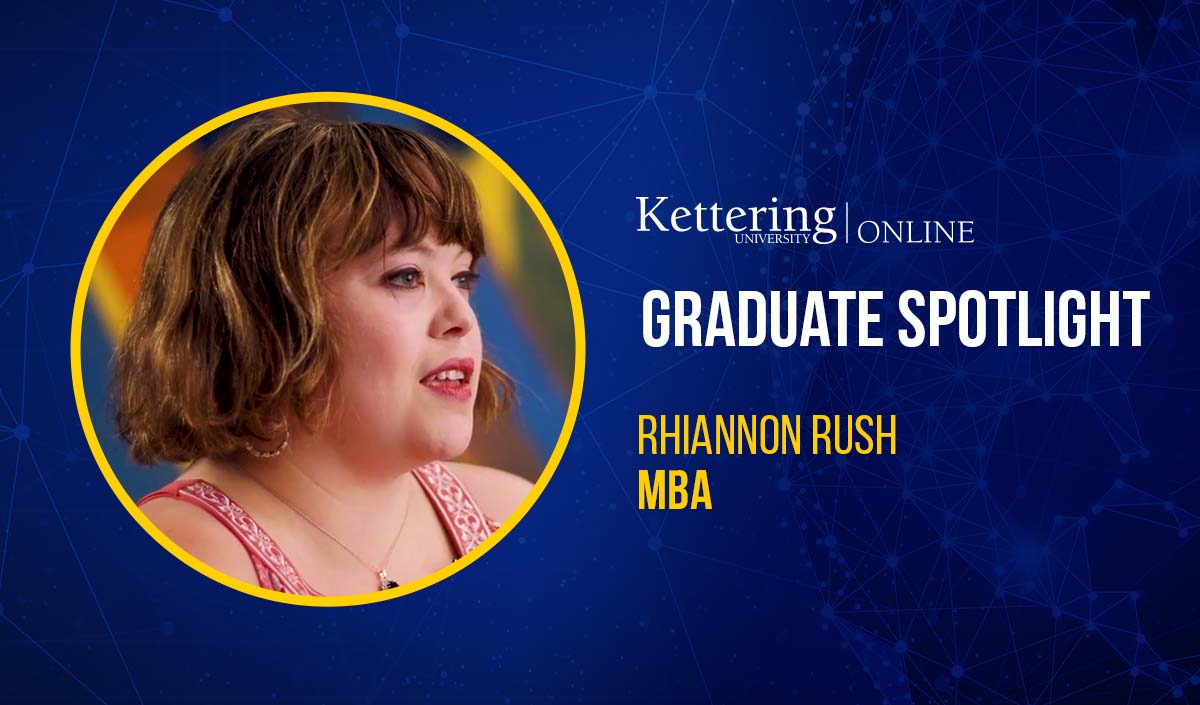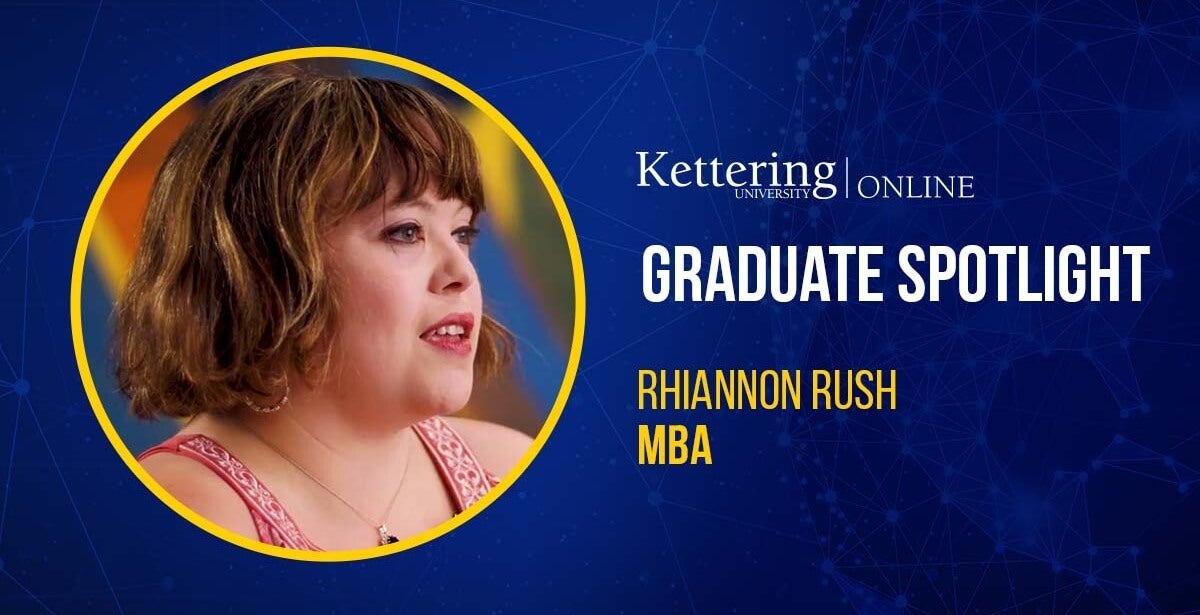
Graduate Spotlight: Rhiannon Rush
As Kettering University Online’s (KUO) Program Development Manager and Senior Instructional Designer, I have the pleasure of meeting our graduating students. In this new blog series, we highlight a few of our graduates from a wide range of educational, career, and geographical backgrounds.
This time, we are happy to spend some time shining the Graduate Spotlight on Rhiannon Rush. Rhiannon recently graduated from Kettering University Online’s MBA and M.S. Lean Manufacturing programs. Here are some excerpts from our conversation.
JL: Hi, Rhiannon. Thanks so much for taking the time to chat. Let’s start by sharing a little bit about your background and professional experience prior to pursuing the Online MBA and MS Lean Manufacturing programs at Kettering University.
RR: Prior to pursuing the programs, I was a department coordinator and supervisor at a manufacturing plant. It was one of those situations where I was thrown into the position without a lot of professional experience or knowledge per se, but nevertheless, I was there and was trying my best to keep things together.
JL: How did you find, and why did you choose, Kettering University Online?
RR: I’ve always had an interest in going back to school to get a Master’s degree; I just wasn’t expecting it to necessarily be as soon as it was. The unique alignment of the pandemic, wanting to carve out a different path for my career, and calling the admissions office for KUO and finding out I could start within a month collectively led me to my choice. I looked into other online programs, but the fact that KUO had more experience online than others, because again, in 2020, many universities were only just starting to try and catch up, as well as the fact that I am from the Flint area, I was very familiar with Kettering’s prestige. I went to Michigan State for my bachelor’s, but it seemed fitting to come back home, so to speak, for my graduate degrees.
JL: Was there a moment that stood out as being particularly insightful or exciting?
RR: There’s been a lot of insightful moments! A top one for me came from my first class, Project Management. Before I was a coordinator, I was an inexperienced project manager for my corporation, with a lot of frustrations with the position and feeling like I wasn’t getting anything done. The class taught me the importance of communication with those above me to gain clarification of expectations, as well as those around me to understand if I change X, how does that affect other teams? Because that was something I saw a lot of issues with at my work, where things would change, but not all stakeholders were necessarily in the know
JL: How about a moment that was particularly challenging? How did you overcome that challenge?
RR: I’d say the most challenging part of the program was time management, especially while I was working as a supervisor. I supervised a small maintenance team that spanned three shifts, so that meant I was always working overtime so I could communicate with everyone on the team. It was most challenging on days when an emergency occurred in the plant, and I stayed over for it, but I learned that planning ahead and not waiting until the last moment to do my coursework was definitely the best way to go.
JL: It sounds like the program offered valuable opportunities for skill development. In terms of the curriculum, which courses or subjects had the most impact on your learning and career growth?
RR: Really, every course offered something valuable. I mentioned Project Management, which I believe also offered a valuable opportunity to do a group project and learn about other people, their companies, roles and responsibilities, and how everyone's skillset can mesh to get to an end goal. Of course, all of the Lean and Six Sigma courses have a huge impact, and I learned through all of them how to effectively problem solve and how to manage workflow. I surprisingly really enjoyed the IT Management course, which I wasn’t expecting to be honest, but some of the concerns with cybersecurity were fascinating to learn about, and I gained a deeper understanding of why frameworks are critical.
JL: What skills do you think this program has helped you to enhance?
RR: The biggest two are definitely problem-solving and managing workflow. Having Lean methodologies under my belt will definitely serve me in the years to come. While I have always thought of myself as a "problem solver," this program has helped me understand how to solve a problem holistically by considering who and what may be affected by it, whether it be other departments affected, costs associated with solving the problem, or anything else.
JL: Now that you’ve completed the program, how would you describe your overall experience and what were some of your key takeaways?
RR: Overall, it has been a great experience, and I am grateful that KUO exists for those of us who are working professionals that want to continue to grow and learn and be better. Some of my key takeaways are the importance of communication, of how to solve problems in a way that makes it so you don’t rehash the same issues over and over again, and just how critical it is for all levels of personnel from workers on the floor to plant managers to CEOs to not only support initiatives but by playing an active role in making it happen.
JL: As a recent graduate, what advice would you give to someone who is considering pursuing an Online MBA or MS Lean program, particularly at Kettering University?
RR: It’s not going to be a walk in the park, but if it was, then everyone would have a Master’s degree, right? My best advice is to just go for it. Make that call to the Admissions Office for KUO, and you just never know what may happen. Kettering University is a great university, which you already know, or else you wouldn’t here be reading this, quite frankly. So, what's really stopping you?
JL: Looking back at your time as an Online student, were there any standout resources, such as online tools, support services, or faculty, you found particularly helpful?
RR: The faculty have all been helpful along the way. It might be a dorky thing to say, but I really love the library of publications I have access to through Kettering. There are so many papers available there, and I remember for one particular paper, I was able to use the resource to compare the application of excessive torque for bolts in a manufacturing facility to the risk of excessive torque being used in laparoscopic surgery. It was fun!
JL: How do you think Online programs, such as the one at Kettering University, compare to traditional, on-campus programs? Are there any notable advantages or disadvantages?
RR: Being able to earn an online degree while still working, I think, has incredible advantages. It means that you don’t have to take a break from working in order to move yourself up. It’s better financially speaking and more flexible, which just makes more sense for those who are working professionals. Not everyone wants to do a traditional on-campus program by taking four, five classes. Not everyone has a flexible enough schedule between work, family, or anything else. Because it is an online program, it’s flexible, and you have the option to take up to 6 years for 10 classes, which I took advantage of a few times between having a death in the family where I just did not want to focus on classes, and with vacations. Having a flexible schedule allowed me to be able to easily say, "Yeah, I can't do these next six weeks; I’ll come back the next session," with no repercussions.
KUO, once again, congratulates Rhiannon Rush on receiving her MBA and MS Lean Manufacturing degrees, and we wish her the best of luck in all of her future endeavors!
Learn more about the Online MBA and Online M.S. in Lean Manufacturing programs from Kettering University.

